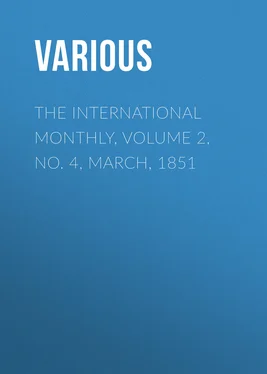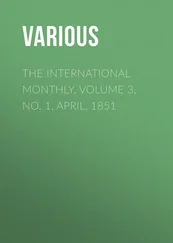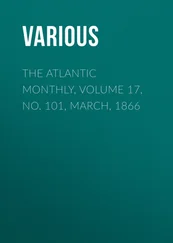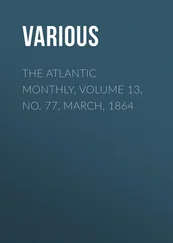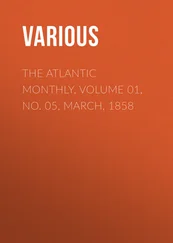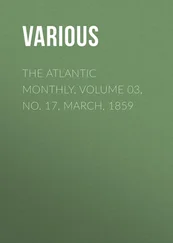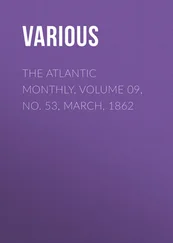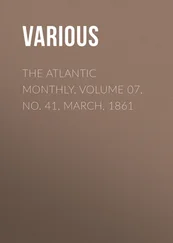Various - The International Monthly, Volume 2, No. 4, March, 1851
Здесь есть возможность читать онлайн «Various - The International Monthly, Volume 2, No. 4, March, 1851» — ознакомительный отрывок электронной книги совершенно бесплатно, а после прочтения отрывка купить полную версию. В некоторых случаях можно слушать аудио, скачать через торрент в формате fb2 и присутствует краткое содержание. Жанр: foreign_antique, periodic, foreign_edu, на английском языке. Описание произведения, (предисловие) а так же отзывы посетителей доступны на портале библиотеки ЛибКат.
- Название:The International Monthly, Volume 2, No. 4, March, 1851
- Автор:
- Жанр:
- Год:неизвестен
- ISBN:нет данных
- Рейтинг книги:5 / 5. Голосов: 1
-
Избранное:Добавить в избранное
- Отзывы:
-
Ваша оценка:
- 100
- 1
- 2
- 3
- 4
- 5
The International Monthly, Volume 2, No. 4, March, 1851: краткое содержание, описание и аннотация
Предлагаем к чтению аннотацию, описание, краткое содержание или предисловие (зависит от того, что написал сам автор книги «The International Monthly, Volume 2, No. 4, March, 1851»). Если вы не нашли необходимую информацию о книге — напишите в комментариях, мы постараемся отыскать её.
The International Monthly, Volume 2, No. 4, March, 1851 — читать онлайн ознакомительный отрывок
Ниже представлен текст книги, разбитый по страницам. Система сохранения места последней прочитанной страницы, позволяет с удобством читать онлайн бесплатно книгу «The International Monthly, Volume 2, No. 4, March, 1851», без необходимости каждый раз заново искать на чём Вы остановились. Поставьте закладку, и сможете в любой момент перейти на страницу, на которой закончили чтение.
Интервал:
Закладка:
This is tolerably good rhetoric, but it is not likely to have much effect when the strong argument and imposing eloquence of statesmen have failed to arrest attention. We see notices of another political novel referring to Canada, which deals more directly, if with less talent, with the disabilities and wishes of the people. It is entitled, The Footsteps of Montcalm , and its hero, descended from a follower of the brave Frenchman, contrasts with his ideal of freedom and happiness, the laws, institutions, habits, and miseries, which he regards as inseparable from the colonial relation. As in the rebellion of 1838, whatever disaffection now prevails in British America, is probably shared much less largely by the English than by the French population. Political, religious, or sectarian novels, however, executed never so cleverly, are but sugared pills at which the appetite revolts as soon as the quality is discovered.
DR. WEBSTER, PRESIDENT OF THE NEW-YORK FREE ACADEMY
Throughout the world an extraordinary degree of attention has recently been directed to systems and means of Education, and the truth has at length been generally recognized that the stability and glory of nations must depend upon the intelligence and virtue of their inhabitants. In our own country, which is most of all interested in the diffusion of knowledge, unexampled efforts are being made not only for the general improvement of the culture offered in the seminaries, but for that elevation of the laboring classes which, whatever may be said by ambitious feeble-minds, seeking for reputation as reformers of the social system, is really to be found only in a wise development of individual capacities for the strife that has been and must be waged for individual well-being.
There have been many improvements suggested or realized lately in collegiate education. We have been gratified with Professor Sedgwick's admirable treatise on the subject, which, at this time, is receiving in England that consideration to which any thing from the mind of one so distinguished is entitled. In this country we think no one, upon the whole, has written more wisely than Dr. Wayland, whose views are to be illustrated in the future government of the university over which he has so long presided. But we shall not be satisfied until we have a great institution, as much above the existing colleges as they are above the common schools in the wards of the city, to which bachelors of arts only shall be admitted, and to which they, whether coming from Harvard, Oberlin, or Virginia, shall be admitted without charge.
The establishment of the New-York Free Academy is suggestive of many things, and of this among them. We suppose a discussion whether our colleges supply the degree of education suitable to our general condition, could be entertained only by dunces; the point whether they furnish the kind and quality of culture to fit men for efficient and just action, in such public affairs and private occupations as the humblest may be called to in a free state, has been amply discussed, and it is decided against the colleges.
Our schools, called colleges, have for the most part been fashioned after the universities of Europe, but they have in all cases been inadequately endowed, and without the internal police which is necessary to their vigorous administration. Nine-tenths of the professors are incompetent, and quite one half of them, in any thing worthy the name of university could claim admission only to the class of freshmen; while those who are capable of a reputable performance of their duties—so uncertain are the revenues of the institutions to which they are attached—are very frequently compelled to modify regulations and relax discipline to such a degree that the colleges become only schools of vice or nurseries of indolence.
The deficiency is of authority . It is useless to talk about courses of study, or any thing else, until the discipline of the schools is as absolute as that of the camp, the factory, or the counting-room. We are inclined to believe that the usefulness of the Military Academy at West Point,—which has furnished so large a proportion of the best civil engineers, lawyers, physicians, and divines, as well as the soldiers who and who alone have conducted our armies to real glory,—we are inclined to believe that this justly celebrated school owes all its triumphs to its rigid laws and independence of popular clamor.
Discipline is every thing. Without it a man is but a fair model in wood, which by it is turned to an engine of iron, and by opportunity furnished with water and fire to impel it on a resistless course through the world. And a man must be governed by others before he will govern himself. The silliness about liberty which is sometimes obtruded into discussions of this subject, is fit for very young children and very old women. There is no desirable liberty but in obedience. The cant about it sometimes illustrates only a pitiable feebleness of intellect, but it more frequently discloses some kind or degree of wilful licentiousness. The "voluntary system" does very well in the churches. It will not do at all in the colleges. St. Paul is always found even with the wisdom of the age in which he is quoted, and he tells us that a youth "differeth nothing from a servant, though he be lord of all, but is under tutors and governors." This is the true philosophy. The "sovereign" people who disregard law, and exult when it is outraged at the cost of an unpopular party, have not learned what is necessary to freedom; they are not fit for it; they will destroy its fairest fabrics, if the state does not prepare its children by a thorough discipline for their inheritance. The way is by free schools and free colleges, supported by public taxes. Sects and parties may have as many seminaries as they choose, and with rules of study and conduct so easily to be complied with, and administrations so lax, that the most contemptible idler or the most independent and self-willed simpleton shall see in them nothing to conflict with his habit or temper; but the graduates of these seminaries will not ascend the pinnacles of fame nor direct the affairs of nations: such affairs will be left for those who have learned, with their arithmetic, the self-denial, reverence and obedience, which are the conditions of the application of addition and division in the high mathematics.
In a free college (and the New-York Free Academy is, in all respects, more justly to be considered a college than are most of the schools which confer academical "honors"), in a free college, of which the professors are responsible only to a judicious board of directors, examinations for admissions and for advancements will be rigid and impartial, the administration will be vigilant and firm, the reckless who will not and the imbecile who cannot acquire a good education, will be dismissed for more congenial pursuits, the rich and the poor will be upon an equality, and only desert will be honorably distinguished.
The New-York Free Academy is eminently fortunate in its officers. Horace Webster, LL. D., is, in all respects, admirably fitted for his position as its President. He perfectly understands the indispensableness of thorough organization, and absolute and watchful discipline. Dr. Webster is a native of Vermont, and is of that family which, in various departments, has furnished the country some of its most illustrious names. At an early age, he became a student of the Military Academy, and so has himself experience of the advantages of that system which he advocates, and illustrates in his own administration. He graduated with distinction, and it is properly mentioned as an indication of his standing at West Point that, while he was a cadet of the first class, he was selected by the government of the Academy to be temporarily himself an instructor. In 1818 he joined the army, as a lieutenant, and after passing one year with his regiment, of which the late General Taylor was at that time the Major, he was elected Assistant Professor of Mathematics in the Military Academy, and returned to fulfil for six years, with constantly increasing reputation, both for scientific abilities and for personal character, the duties of that office, which it scarcely need be said are more difficult at West Point than in any other school in America. Among the distinguished gentlemen who were associated with him in teaching or as students during this period, were General Worth, Colonel Bliss, Colonel Thayer, Colonel Mansfield, and Professors Alexander D. Bache, LL. D., Charles Davies, LL. D., E. C. Ross, LL. D., and John Torrey, LL. D. Resigning his commission, he was in 1825 made Professor of Mathematics and Natural Philosophy in Geneva College, and he filled this place twenty-three years, leaving it in 1848, to accept the Presidency of the New York Free Academy. We conceive that nothing could have invested this school with a higher claim to respect, or challenged for it a larger degree of confidence, than the selection of a man of such experience, capacities, and reputation, to be its chief officer; and for the class of persons likely to come under his instruction, no course of study could be more judicious, no training more admirably adapted, than may be expected from one who has been so long and so successfully engaged in preparing men for the most difficult and important offices. His attainments needed no illustration, and his administrative abilities have been amply vindicated by his government of the Free Academy.
Читать дальшеИнтервал:
Закладка:
Похожие книги на «The International Monthly, Volume 2, No. 4, March, 1851»
Представляем Вашему вниманию похожие книги на «The International Monthly, Volume 2, No. 4, March, 1851» списком для выбора. Мы отобрали схожую по названию и смыслу литературу в надежде предоставить читателям больше вариантов отыскать новые, интересные, ещё непрочитанные произведения.
Обсуждение, отзывы о книге «The International Monthly, Volume 2, No. 4, March, 1851» и просто собственные мнения читателей. Оставьте ваши комментарии, напишите, что Вы думаете о произведении, его смысле или главных героях. Укажите что конкретно понравилось, а что нет, и почему Вы так считаете.
